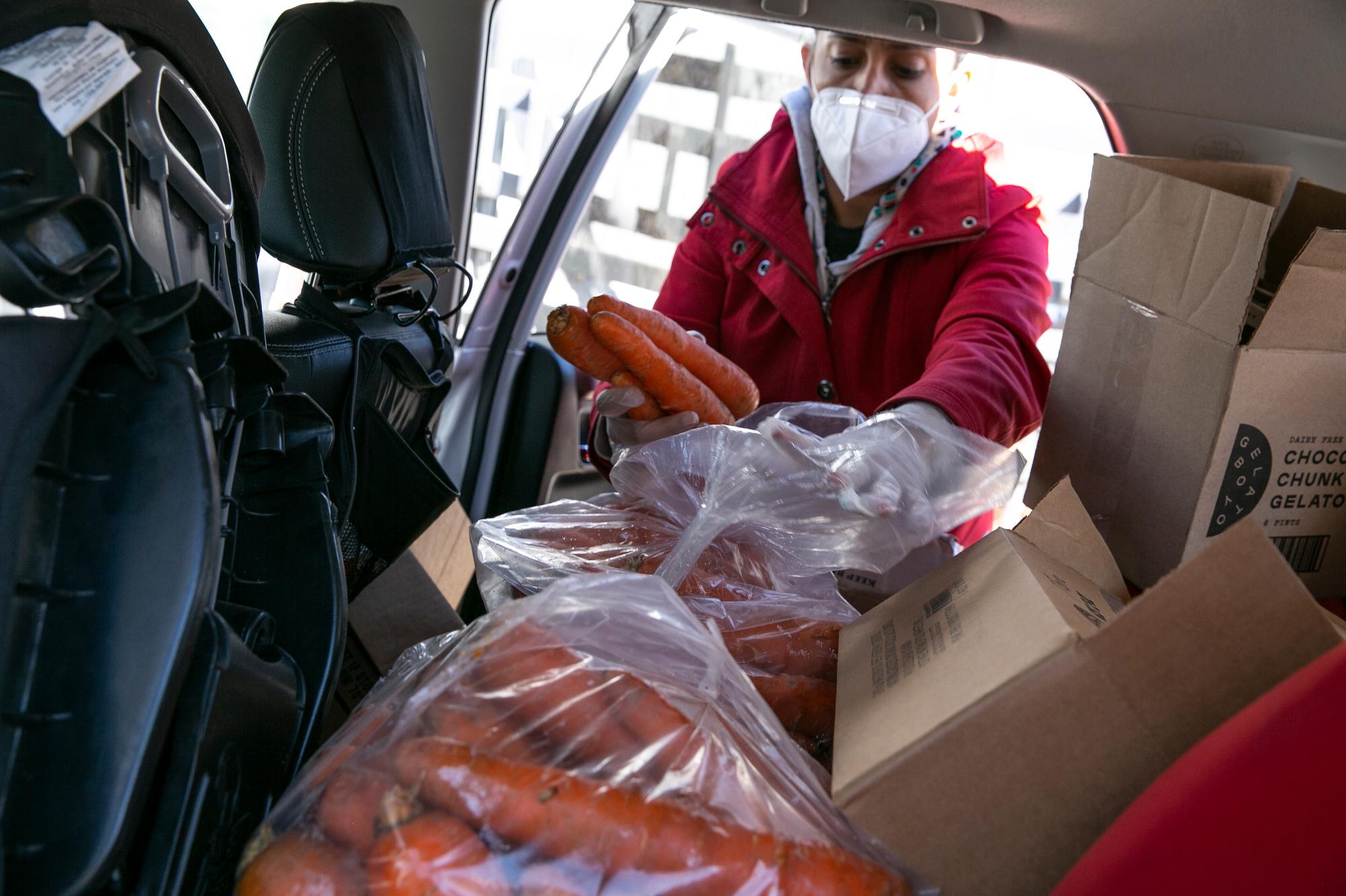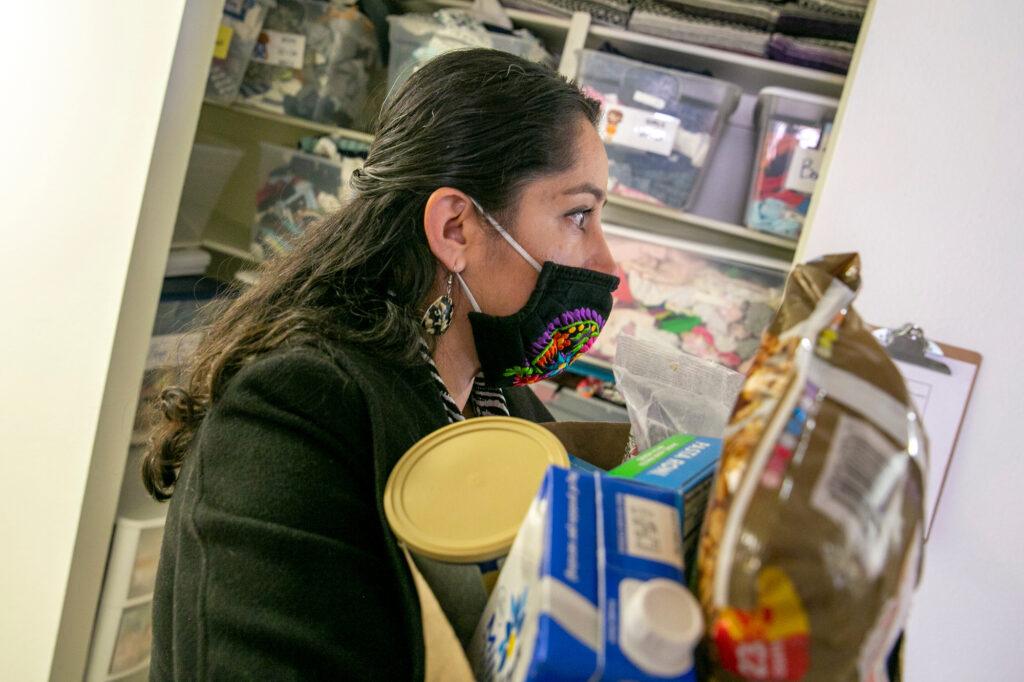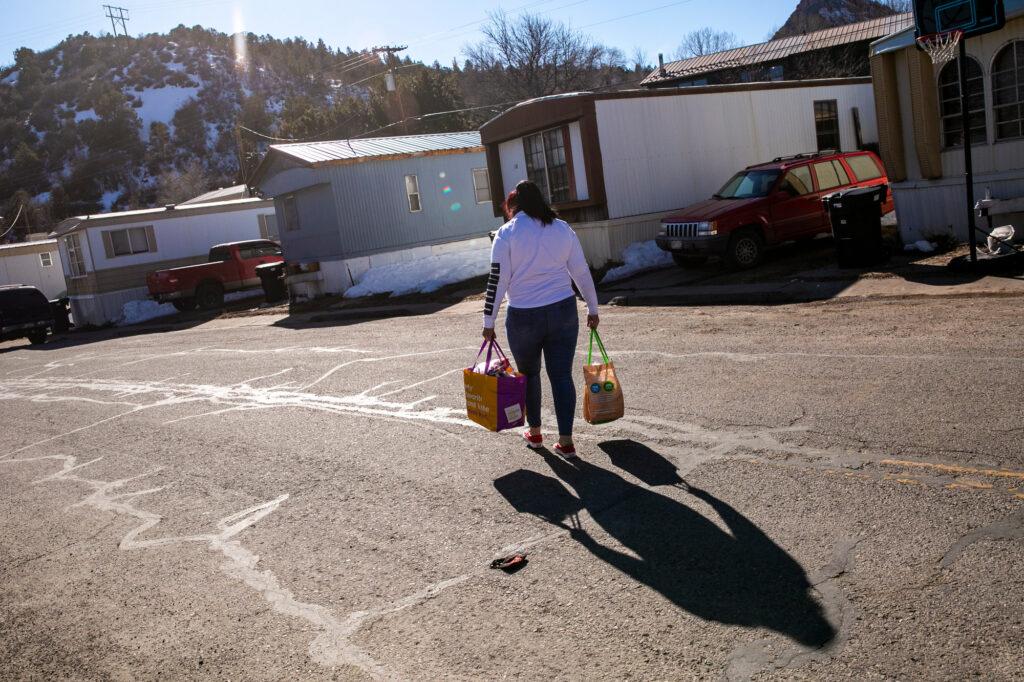
Beatriz Garcia has been incredibly busy for the last year. As program manager of Compañeros, a Durango-based resource center for people who are undocumented, she’s responsible for getting the community help with everything from legal problems to vaccine appointments.
On a recent mild day, Garcia coordinated over the phone with a volunteer who helps her deliver food and other goods to people in need in La Plata County. After they agreed on a time to meet up, she hopped in her SUV loaded with groceries, hygiene and cleaning products.
“We’re going to the closest trailer park,” Garcia said, driving to a neighborhood on the edge of Durango. “They have a good amount of Spanish-speaking families there.”
Undocumented immigrants who have been hard-hit financially by the pandemic have fewer places to go for aid. They don’t qualify for much of the help the state and federal government has provided to support people affected by COVID-19. Garcia said Compañeros has filled a big hole for people who are undocumented in the area.
Before the pandemic, the organization primarily helped people with translation and legal services, education and more. But over the last year, as the need has changed, the focus has shifted to providing things like rental assistance, gift cards, diapers and food.
The organization gave out a thousand food boxes to families in the Four Corners last year, and provided nearly $250,000 in rental assistance and other aid. It’s been getting support from a local soup kitchen, AidtoAll, and the Left Behind Workers Fund — a group created last year to collect and distribute donations specifically to help people who are undocumented during the pandemic.

Stepping up in the pandemic to help their neighbors
As Compañeros’ mission has expanded, so has the number of people who’ve received aid and are willing to help others.
In another mobile home park near Durango, Compañeros relies on a volunteer named Reyna and her family to help get food boxes to neighbors who lack transportation to pick them up themselves.
CPR News is not using Reyna’s full name because she fears any public attention could jeopardize her application for citizenship. Speaking in Spanish, Reyna said her life has become more stressful because of the pandemic.
“It’s very restricted at this point,” she said. “Work has been slow, less and less.”
She cleans homes for money while her husband, who is a U.S. citizen, paints houses. They had already known about Compañeros for years before the pandemic. When both of their jobs slowed down and they struggled to pay rent and feed their children, they turned to the organization to get help with food and other expenses.
Reyna said it didn’t take long for her to realize that her neighbors also needed groceries. So she started picking up extra boxes and coordinated getting them to others nearby.
“It’s kind of like a chain. Whoever you can help, helps the next person,” Reyna said. “I don’t like seeing kids suffer because of a lack of food.”
Reyna added that she was worried people might run out of money and turn to drastic measures, like stealing, to feed their children. So she’s happy to help others.
Compañeros manager Garcia said Reyna has been incredibly active in her neighborhood.
“She's a good example of how the community can be united and she has benefited from others but she is also willing to help and get things done for others,” Garcia said.

Compañeros is also working to expand COVID vaccine access
The networks Compañeros has developed in these communities are important, especially as the organization now looks to help get people vaccinated against COVID-19.
Compañeros has worked with the San Juan Basin Public Health Department to provide translation services and transportation. They’re helping bridge the gap, especially for vaccine-eligible people who don’t have access to the Internet or information in Spanish to make an appointment.
The group is also trying to address fears among people who are undocumented that seeking the vaccine might bring them to the attention of immigration enforcement or affect their applications for citizenship. The health department has helped that effort, Garcia said, by not asking people for identification or other documents.
Many of Garcia’s clients work in food service and hospitality, making them eligible for a vaccine in the coming weeks. So it's crucial to build trust in the community and provide accurate information in English and Spanish now, she said.
“It’s definitely challenging. I thought everybody would be in line once the vaccine is ready but I was really surprised to see how some have taken a step back,” Garcia said. “We know it’s a need and there are vaccines available, so we want to make sure people get that.”
How to get the COVID-19 Vaccine in Durango
Who is eligible for a vaccine in Colorado right now:
- Anyone 60 or older
- K-12 teachers or school staff
- Nursing home residents
- Grocery store workers
- Health care workers
- Agricultural processing workers
- People 16-59 with two or more high risk health conditions
Making a vaccine appointment:
- Follow Compañeros on Facebook and Instagram for updates, or call (970) 375-9406
- Follow San Juan Basin Public Health on Facebook
- Call San Juan Basin Public Health in Durango: (970) 247 5702
- Call San Juan Basin Public Health in Pagosa Springs: (970) 264 2409
- Sign up for vaccine availability notifications from San Juan Basin Public Heath
- Sign up at Pagosa Springs Medical Center or call (970) 507-3995
- Text Pagosa Medical Group at (970) 372-0456
- Sign up at Animas Surgical Hospital or call (970) 403-1345
- Sign up at Centura Mercy Regional Medical Center or call (866) 414-1562
- Sign up with the Upper Pine Fire Protection District (Bayfield residents only) by emailing [email protected] with your name, phone number, address, and age
- Sign up at City Market or call (866) 211-5320
- Sign up at Albertson’s
- Sign up at Walmart
CPR's Hart Van Denburg contributed to the reporting for this story, and Blake Simony helped with translation.



















